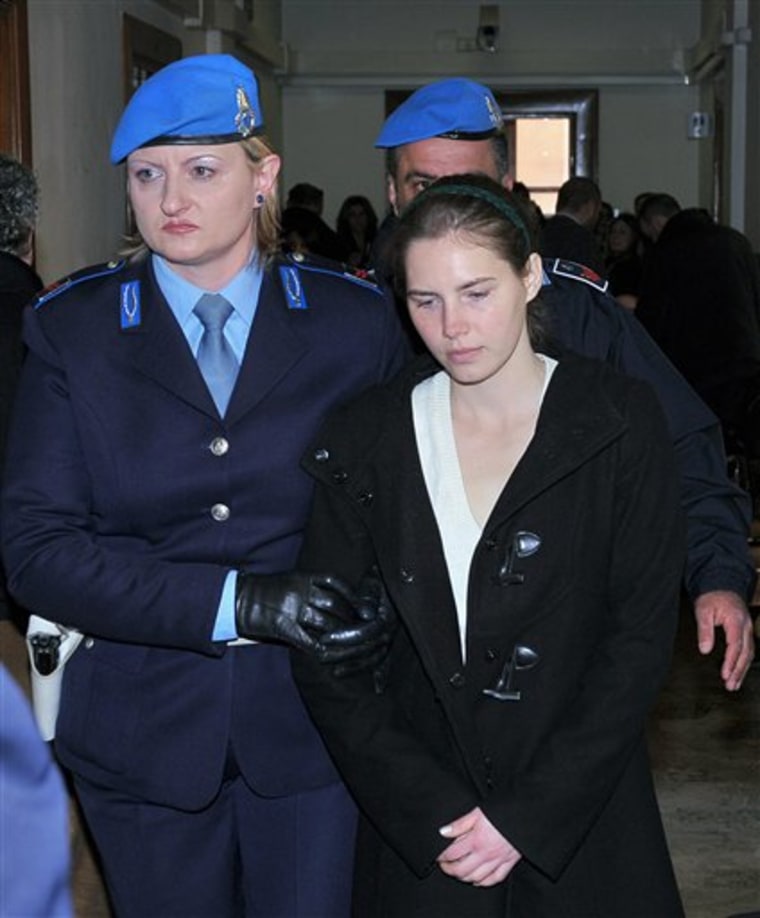Independent forensic experts reviewing evidence in Amanda Knox's appeals trial have found very low traces of DNA on the knife allegedly used in the murder of her roommate, possibly too small to determine in a retest whether the American's DNA was on it, news reports and a lawyer said Friday.
If confirmed, the finding could boost Knox's chances of having her murder conviction overturned. However, defense lawyers were cautious in their reaction, and an attorney representing the victim's family said the finding had been expected and that even low DNA traces might be analyzed.
The independent experts have been appointed by the appeals court to review DNA traces on the knife believed to have been used in 2007 to kill Meredith Kercher, the Briton who shared an apartment with Knox in Perugia. The experts are also reviewing traces on Kercher's bra clasp.
In the first trial, prosecutors maintained that Knox's DNA was on the knife's handle and Kercher's DNA on the blade. They said the DNA of Knox's co-defendant and ex-boyfriend, Raffaele Sollecito, was on the clasp of Kercher's bra.
The independent experts found only slight traces of DNA on the knife, making it difficult for them to be retested, according to the ANSA news agency and Francesco Maresca, a lawyer for Kercher's family. They also found that the bra clasp was too damaged to try to find DNA, ANSA said, without citing sources.
"They have found that the biological material on the knife was insufficient to immediately carry out new tests," said Maresca, who is part of the trial because the Kerchers are civil plaintiffs in the case.
"It's nothing new," he insisted. "Very small quantities have still been found on the knife where they had been found before."
Maresca said he might ask for a retest anyway as the independent experts from Rome's Sapienza university, Stefano Conti and Carla Vecchiotti, continue their review of both pieces of evidence on April 5.
"We, along with the experts from the prosecution, are evaluating this possibility," Maresca said, adding that such a request was likely. The review takes place in the presence of experts appointed by the parties.
The police forensic expert who originally analyzed the evidence said at the time of the first trial that the traces were small but sufficient to determine attribution.
But the defense has always maintained that DNA traces presented at the first trial were too low and inconclusive. It also contends the traces might have been contaminated when they were analyzed. The bra was recovered in the apartment several weeks after the slaying.
The review of the evidence was granted by the appeals court at the defense's request, and any result short of confirming the attribution would weaken the persecutors' case. DNA evidence was crucial in the first trial, where a clear motive did not emerge for the brutal killing.
Carlo Dalla Vedova, a lawyer for Knox, declined on Friday to comment on the preliminary results. The experts have until May 9 to complete their review, and are scheduled to report to the court on May 21.
Luca Maori, an attorney for Sollecito, expressed caution and also said he was awaiting further results from the review.
Prosecutors in the case could not be reached for comment.
If the independent experts conclude that new tests of the DNA traces can't be carried out, they must review the analyses carried out previously and assess whether they are reliable.
Knox and Sollecito have always denied wrongdoing, saying the were not at the house Knox shared with Kercher the night of Nov. 1, 2007, when the Briton was stabbed to death. Instead, the two defendants say they were at Sollecito's house.
They have both appealed the 2009 convictions for murder and sexual assault. Knox was sentenced to 26 years in jail and Sollecito to 25.
Their appeals trial continues Saturday with a key prosecution witness to take the stand.
